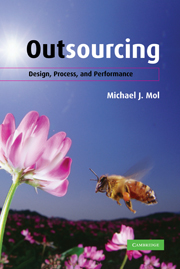Book contents
- Frontmatter
- Contents
- List of figures
- List of tables
- List of boxes
- Acknowledgments
- 1 Outsourcing
- 2 What we know about outsourcing
- 3 A new perspective
- 4 The outsourcing process
- 5 Shifting the curve
- 6 Shifts of the curve
- 7 Managing outsourcing
- 8 Outsourcing research agenda
- 9 Future trends and conclusions
- Appendix
- References
- Index
7 - Managing outsourcing
Published online by Cambridge University Press: 03 February 2010
- Frontmatter
- Contents
- List of figures
- List of tables
- List of boxes
- Acknowledgments
- 1 Outsourcing
- 2 What we know about outsourcing
- 3 A new perspective
- 4 The outsourcing process
- 5 Shifting the curve
- 6 Shifts of the curve
- 7 Managing outsourcing
- 8 Outsourcing research agenda
- 9 Future trends and conclusions
- Appendix
- References
- Index
Summary
Earlier chapters have focused entirely on the academic perspective of outsourcing, with a view to describing the phenomenon. In this chapter the question that will be addressed is what further advice can be given to managers who deal with outsourcing, to generate some prescription as well. In previous chapters various building blocks for a firm's outsourcing policy have been provided. Here two popular prescriptive notions are first dispelled, around core competences and outsourcing and around strategic outsourcing, by laying out their premises and debating those, and this leads to a much more refined understanding of both ideas. The chapter then moves on to discuss the role of managerial intent in outsourcing before offering a perspective on outsourcing as experimentation. Next is the treatment of the relation between outsourcing and corporate strategy, and this is followed by a discussion of what is tentatively called the optimal outsourcing tool. In the process, I try to identify a number of practical guidelines.
Core competences and outsourcing
In chapters 1 and 2 the writings of James Brian Quinn were referred to many times. Quinn (1992; 1999; 2000; Quinn, Baruch, and Zien, 1997; Quinn, Doorley, and Pacquette, 1990; Quinn and Hilmer, 1994) is the best-known representative of the school of thought that argues both that “if an activity is not core, it is best outsourced” and that “if you are not the best in the world in an activity, find a supplier who is and outsource to that supplier.
- Type
- Chapter
- Information
- OutsourcingDesign, Process and Performance, pp. 144 - 165Publisher: Cambridge University PressPrint publication year: 2007



